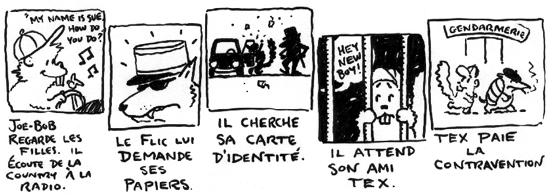|
|||||||||||||||||||||||||||||||||||||||||||||||||||||||||||||||||||||||||||||||||||||||||||||||||||||||||||||||||||||||||||||||||||||
|
|||||||||||||||||||||||||||||||||||||||||||||||||||||||||||||||||||||||||||||||||||||||||||||||||||||||||||||||||||||||||||||||||||||
definitions: transitive direct, transitive indirect, intransitive Transitive verbs by definition have an object, either a direct object or an indirect object. Intransitive verbs never have objects. A transitive-direct verb acts directly on its object. In the first sentence below, the telephone is the direct object. The verb 'entendre' (to hear) always takes an object; one hears someone or something. A transitive-indirect verb acts to or for its object. Tex is the object of the preposition à in the second sentence since Joe-Bob is talking to him. Intransitive verbs, on the other hand, have no object at all. The verb dormir (to sleep) in the last example, does not need any object to complete it. In fact, because the verb is intransitive, it cannot take an object. Intransitive verbs (as well as transitive ones) may be modified by adverbs or prepositional phrases: 'Joe-Bob sleeps in the car; he sleeps all the time.' transitive verbs Because transitivity has to do with meaning, most English and French verbs usually maintain the same distinction. Thus, verbs that are transitive in English are also transitive in French, and verbs that are intransitive in French are also intransitive in English. The following examples are transitive in both French and English.
special cases There are, however, special cases where the transitivity of French and English verbs contrast. There are several very common verbs which take a direct object in French, while the English equivalent is followed by a preposition (at, to, for) and object. REDCAP is an acronym for the most frequent verbs in this category: Regarder, Ecouter, Demander, Chercher, Attendre, Payer. Joe-Bob explains what happened:
preposition + object in French / direct object in English There are also several verbs which have a preposition and object in French, whereas the English equivalent takes a direct object.
Here are examples of such verbs. These are discussed more fully with indirect objects and indirect object pronouns.
stated and implied objects For many transitive verbs, in both French and English, the object is sometimes implied or understood. Do not be concerned about labelling these verbs, since the meaning will be clear from the context; and, like most verbs, they will form their passé composé with avoir.
intransitive verbs Perhaps you have already seen verbs which use être to form the passé composé. These être verbs (aller, arriver, partir, sortir, etc.) are the most frequent intransitive verbs and they are summarized in the Alamo d'être. Etre verbs are often described as verbs of motion, but it's important to note that there are many other intransitive verbs of motion which use the auxiliary avoir, for example, 'marcher' (to walk) and 'courir' (to run): 'Tex a marché vite. Les enfants de Rita ont couru.' transitive or intransitive Some verbs may be either transitive or intransitive. Contrast the following verbs. Note that the verb sortir uses the auxiliary verb être in the passé composé as an intransitive verb, but avoir in the passé composé when it is used transitively.
There are several cases where a verb which may be transitive or intransitive in English must be translated by two different verbs in French: 'to return' (retourner, rendre), 'to leave' (partir, laisser, quitter). verbs with direct and indirect objects Many transitive verbs may have both a direct and an indirect object, for example:
Here is a list of some common bivalent verbs:

|
© 2014 • tex's french grammar • first year french • ut austin • contact |
|
|||||||||||||||||||||||||||||||||||||||||||||||||||||||||||||||||||||||||||||||||||||||||||||||||||||||||||||||||||||||||||||||||||
